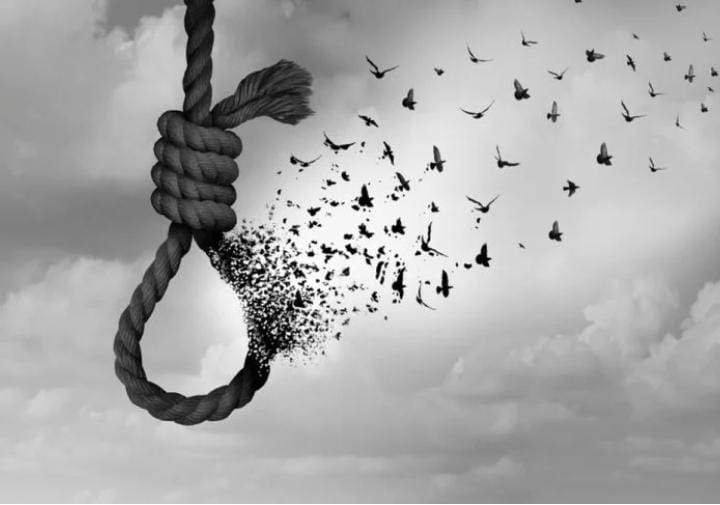Of late, Nigeria has witnessed a tremendous rise in the number of suicide cases in the country.
Experts said Nigeria is gradually seeing a return to having policemen mount guards on Lagos bridges, especially the Third Mainland Bridge, considered to be a suicide hotbed, to arrest those with suicide intent.
In a report by PUNCH, no fewer than 79 persons committed suicide in Nigeria in 2022.
Findings showed that the 79 persons comprised 70 males and 9 females were involved within the period.
The figure, it was noted, did not include the number of suicide cases not reported by journalists.
The breakdown showed that Lagos ranked highest with 12 suicide cases; followed by Oyo; 10; Kano, four; Anambra three; Edo, three; Delta, three; Ogun, three; and Rivers, three.
A Professor of Psychology at the Department of Psychology, Adekunle Ajasin University, Ogun State, Bolanle Ogungbamila, blamed the current spike in the number of people dying by suicide due to the dire economic situation.
He told PUNCH Healthwise that the economic condition in the country had reduced or stopped the level of support people get at the family level because most people no longer have enough to take care of themselves.
Ogungbamila, who is also the Coordinator of Pre-degree Social Sciences, at the Adekunle Ajasin University, said people no longer have the psychological wherewithal to cope with the situation in the country and have taken to suicide ideations.
“Instead of facing the challenges, some people begin to see themselves as the cause of the problems they are facing and with it comes this self-guilt that leads to depression and consequently, suicide attempts or they end up committing suicide,” he said.
Apart from the economic situation in the country, he said people with serious mental health disorders are also at risk of dying by suicide because of auditory hallucination that comes with it.
“One of the symptoms of schizophrenia, a serious mental disorder in which people interpret reality abnormally, is auditory hallucination, which in some cases, leads to suicide and suicide attempts when the patient is not monitored,” he quipped.
He said these categories of people might hear voices that may tell them to jump into the river or kill themselves and because they interpret things abnormally, they would obey the voice.
The psychology professor noted that there might also be suicidal tendencies among people with bipolar disorder, which can be triggered by depression.
“Bipolar disorder can involve symptoms of depression, which sometimes leads to thoughts of suicide. Though not everyone with bipolar disorder experiences the condition in the same way, those who experience intense depressive episodes might have recurrent thoughts about ending life,” he added.
Lately, the case of a Lagos socialite, Mrs. Farida Sobowale, who was rescued by passersby on Third Mainland Bridge, while attempting to plunge to her death, is still generating reactions.
The woman, who owns House of Phareedah Bodycare and Spa, in a viral video, was seen weeping and surrounded by concerned Nigerians.
Earlier, before Farida’s suicide attempt, the body of a young man, who jumped into the Lagoon from the Lekki-Ikoyi Link Bridge end, was recovered.
The victim was suspected to have died by suicide two days earlier, the Lagos State Emergency Management Agency, revealed in a statement.
In another development, a female officer of the Nigerian Air Force, simply identified as George, also died by suicide in her residence in Ikeja, Lagos.
The officer, a Master Warrant Officer stationed at 651 Base Services Group Resident, Sam Ethem Air Force Base, was discovered lifeless, prompting an immediate investigation into the circumstances surrounding her demise.
Findings made by the military showed she died by suicide inside her room at about 1400hrs on June 10, 2023.
In a similar development, on May 19, it was reported that a former Battalion Commanding Officer, who led the fight against Boko Haram in the North East, Major U.J Undianyede, died by suicide.
It was learnt that he died less than 72 hours before the verdict of a court-martial trying him for alleged military infractions during the war was made known.
Many more such suicide cases abound all over the media and according to experts, such acts will continue to happen unless the triggers are addressed.
According to the psychologists, who spoke with our correspondent, untreated emotional wounds would definitely lead to depression, one of the factors in the spike of suicide in the country today.
“Unfortunately, the recent happenings in Nigeria is gradually sliding many citizens, especially youth, into depression, leading to rising cases of suicide, suicidal tendencies and suicide attempts among Nigerians, who have refused to seek help from psychologists or psychiatrists due to stigmatisation,” Ogungbamila said.
He noted that there is a need to educate to seek help for mental illness, stressing that such a move does not mean that they are mad or less human.
“If you are treated for such illness, you are more balanced. We need to see psychological or psychiatry treatment just the way we see seeking help for malaria and headache,” he added.
The psychology professor decried the fact that people with emotional hurts seek spiritual solutions, instead of getting professional help.
Ogungbamila said, “There should be more awareness and education on this issue. People should know that there is a need to seek help when depressed. The government is currently giving out palliatives to Nigerians and such quick intervention is needed to calm the situation. The palliatives should be sustained as a quick psychological win.
The government should also create an enabling environment for businesses to thrive, especially the SMEs that would support the poor and young people. More importantly, family and friends should check on their loved ones. We need to be trained on how to manage the situation in the country.
“The first thing that happens to a depressed person is that he turns the anger, to himself instead of looking for a solution. They need to be told that they are not the problems, and hence, they need to be happy and love themselves too.
“Apart from the book’s explanation of the factors that precipitate suicidal ideation, we need to research on the factors fueling suicidal ideation in young adults because before suicide takes place, it would have been thought of; it is a product of deep thoughts.
“So, we have seen quite a number in the schools, where one of my postgraduate students is currently researching on suicidal ideation among students in secondary schools.”
According to the Nigerian Postgraduate Medical Journal, depression is a major public health problem with a prevalence of 4.4 per cent in the global population, and 5.4 per cent in the African region and affects about 322 million people globally.
The publication noted that depression, like in other regions of the world, is more common among females (5.9 per cent) compared to males (4.9 per cent) in Africa. The prevalence of depression in Nigeria is estimated at 3.1 per cent, while the estimated incidence increased worldwide by 49.86 per cent from 172 million in 1990 to 258 million in 2017. There is a notable increase in Western sub-Saharan Africa by 124.42 per cent.
A Psychiatrist at the Federal Neuro-Psychiatric Hospital, Yaba, Lagos, and a member of Employee Assistance Professionals, Dr. Odete Williams said depression is a major co-efficient of suicide, yet many people never felt that it is a serious mental health issue that should be given serious attention to save the lives.
Depressed patients, he said, need help and require the services of psychologists or psychiatrists.
He lamented that the stigma associated with depression, especially among those seeking the services of psychologists or psychiatrists in Nigeria, is one of the reasons people who need evaluation of their mental health shy away from professional services, thereby worsening the already precarious situation.
While noting that some medications, including antidepressants, can cause some people to experience suicidal feelings, he said, “Some antipsychotic medications and mood stabilisers also cause some people to develop suicidal propensities. “Abroad, people that join gay and lesbianism, are prone to suicide, when society starts lashing out at them. It may become unbearable to the extent that they may resort to taking their own lives, as an escape from the overwhelming and unbearable trauma.”
A Clinical psychologist with Lagos University Teaching Hospital, Idi-Araba, Lagos, Dr. Nduka Emeka, who said substance abuse could also be a trigger in the spike of suicide recorded in the country, advised people feeling frustrated and feeling a sense of hopelessness to see a psychologist, a psychiatrist, or any other specialist in mental health.
On what could be subtle suicide signs, the US National Institute of Mental Health stated, “There is the feeling of emptiness, hopelessness, trapped, or having no reason to live, extremely sad, more anxious, agitated, or full of rage and unbearable emotional or physical pain.
“Changes in behaviour may occur, such as making a plan or researching ways to die; withdrawing from friends and the things that used to give him or her joy; saying goodbye to loved ones; giving away important and valuable items or making a will; taking dangerous risks such as driving extremely fast; displaying extreme mood swings; eating or sleeping more or less; and using drugs or alcohol more often.
“If these warning signs apply to you or someone you know, get help as soon as possible, particularly if the behaviour is new or has increased recently.”
However, the World Health Organisation targets 2030 to achieve a reduction of the global suicide rate by one-third.
Sequel to this, the WHO, launched an intervention known as ‘Live Life’.
The successful implementation and scale-up of ‘Live Life’ interventions relies on six crosscutting foundational pillars – Situation analysis; Multisectoral collaboration; Awareness-raising and advocacy; Capacity-building; Financing as well as Surveillance, monitoring and evaluation.
“In planning and implementation of suicide prevention activities, we must understand the profile of suicide and suicide prevention. Analysis can be done nationally or regionally in consultation with policymakers, epidemiologists, persons with live experience and service providers. Suicide prevention takes leadership and political will. All sectors of society must work together,” WHO stated.
Meanwhile, the Nigerian constitution frowns deeply at suicide and clearly spelt out punitive measures for those caught embarking on such venture.
According to Section 327 of the Criminal Code Act, titled, ‘Attempting to commit suicide’, criminalises the act.
“Any person who attempts to kill himself is guilty of a misdemeanour and is liable to imprisonment for one year,” the code states.
Credit: Punch












Leave a Reply